|
|
 Jen Jen |
 |
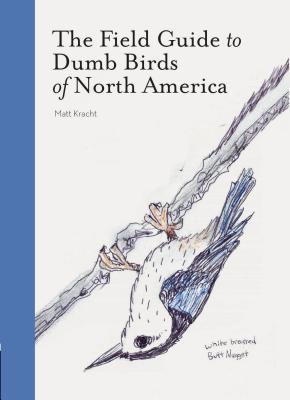
|
 |
The Field Guide to Dumb Birds of North America
Matt Kracht
I read a field guide from cover to cover. Really. Ok, so it’s a sort of parody field guide, but still. The Field Guide to Dumb Birds of North America is worth reading cover to cover. A warning: if your sensibilities are offended by foul language (not to be confused with fowl language), you might want to steer clear. For those of you who like birds AND have no qualms about language, this is a must read—from cover to cover. The illustrations are poorly hand-drawn pencil sketches done by the author. Each bird has been re-named (my guess is that the author’s inner-9 year old boy generated the new names); for example the Eastern Kingbird became Eastern Kingbutt. The format of the book is much like other bird field guides, but with much funnier (and admittedly, less helpful descriptions). If the author feels a bird is a bit stuffy, he’s sure to let you know—ie: “…Thinks he’s better than you.” Did I mention I think you should read it cover to cover? |
| |
|
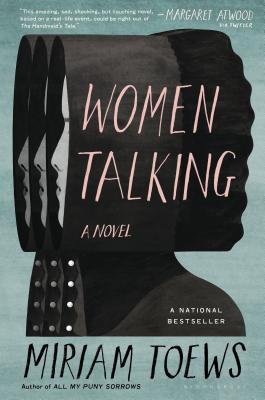
|
|
Women Talking
Miriam Toews
I listened to Women Talking on libro.fm. This short novel is based on historical events—it was discovered in a Mennonite colony in Canada that some of the men had been sneaking into the homes of others at night, drugging the women, and raping them. Women Talking is an imagined meeting of the colony’s women, deciding if they should stay or go, and the consequences of their decisions. Minutes of the meeting are taken by the only man the women trust, August Epp. In addition to being trustworthy, August has the ability to read and write, which the women do not. The book is rich with philosophical reflection. On the cover of the book is a quote from Margaret Atwood: “This amazing, sad, shocking, but touching novel, based on a real-life event, could be right out of The Handmaid’s Tale.” I think this book will especially appeal to fans of Marilynne Robinson’s Gilead. |
| |
|

|
|
Convenience Store Woman
Sayaka Murata
Sometimes it’s nice to read a short novel, one you can start and finish in 1-2 sittings. If you’re looking for a quick read with a quirky protagonist set in a place you’re probably not familiar with, Japan, give Convenience Store Woman a try. The narrator is a 36 year old woman who might be autistic (it’s never really stated.) She’s worked in a convenience store for the past 18 years. Her family and friends think she should move on to a better job and/or get married. This probably isn’t all that practical. The narrator spends a great amount of time figuring out how to “appear normal.” She copies the gestures, facial expressions, speech, etc. of those around her to accomplish the appearance of being normal (and the reader gets the sense that despite her best efforts, she’s not entirely convincing.) Nonetheless, the pressure of friends and family to settle down pushes her to try to appease their demands. She brings home a man that can truly only be described as a loser. I won’t give away the ending—if you choose to pick this book up, you’ll be to the end before you know it anyway. The voice of Convenience Store Woman is unique, quirky, and I consumed it in greedy gulps. |
| |
|
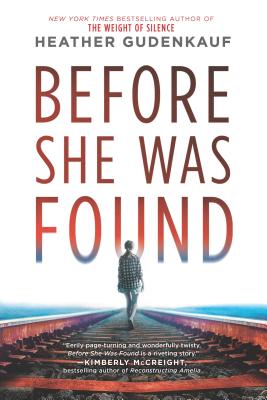
|
|
Before She Was Found
Heather Gudenkauf
Another book I recently listened to on Libro.fm was Before She Was Found by Heather Gudenkauf. It was narrated by Brit Pressly, who is an excellent reader. In Before She Was Found, three teenage girls sneak out to a trainyard at night. When they’re found in the morning, one is bloodied and in bad shape (but alive) and the other two are shaken but not hurt. The story of what happened is brilliantly crafted. Issues include online danger, bullying, middle school relationships/dynamics, and the complexities of families. The narrative is told from a number of points of view and sources such as the victim’s journal, police interviews, psychiatrist, and parents. The author, Heather Gudenkauf, is from Iowa and we came to know her when we sold books at last year’s Brainerd Library Friends Words and Wine event. Heather was one of the featured authors. Since meeting Heather, I’ve read (and loved!) two of her books. She writes in the mystery genre. |
| |
|
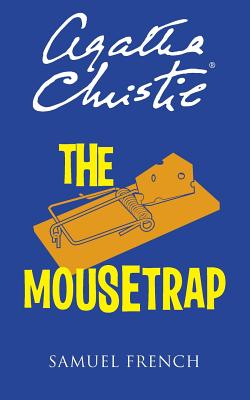 |
|
The Mousetrap
Agatha Christie
 I’m reading the script of The Mousetrap over and over and over, in preparation for the production of it this month in Hubbard at Long Lake Theater. I hope you’ll come to see it! (This shameless plug was provided by Vision Theatre, producer of aforementioned Mousetrap.) I’m reading the script of The Mousetrap over and over and over, in preparation for the production of it this month in Hubbard at Long Lake Theater. I hope you’ll come to see it! (This shameless plug was provided by Vision Theatre, producer of aforementioned Mousetrap.)
|
| |
|
|
|
|
|
 Sally Sally |
|
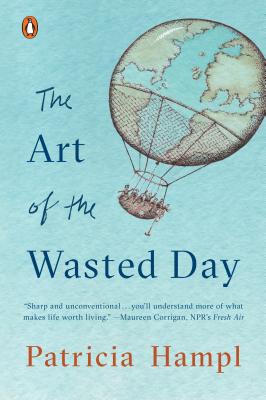
|
 |
The Art of the Wasted Day
Patricia Hampl
What a delight this book is! On one level, it’s like a conversation with a favorite professor of English who nimbly moves among the classic works of literature you love but haven’t read for a long while. On another, it’s a travelogue of visits to the homes of disparate people who made the art of the wasted day (that is, leisure) their way of life. The life of Michel Montaigne is woven throughout the book, but Hampl also considers The Ladies, two eighteenth-century Irish women who ran off to a life of “retirement” in Wales, and Gregor Mendel, the geneticist who was also a priest. Hampl also reflects on her own life—from a girl daydreaming under a beechnut tree in the backyard to a widow recalling favorite moments from a loving marriage. After a lifetime of travel, she finds herself remembering a trip close to home—a leisurely trip down the Mississippi with her husband in an old cabin cruiser.
Hampl demonstrates the value of getting lost in thought, a possibility when one has the leisure for a “Wasted Day.”
|
| |
|
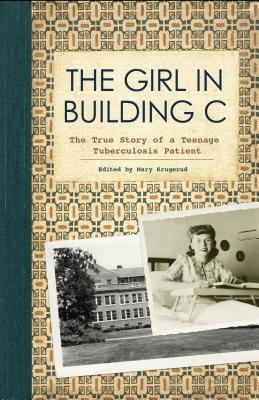
|
|
This review first appeared in our March newsletter. We’re running it again because the Sister Wolf Book Group will be reading it in June.
The Girl in Building C
edited by Mary Krugerud
Our rep from the Minnesota Historical Society Press sent me a copy of this book, saying that I’d want to be aware of it because it’s set in Walker, just a few miles from Park Rapids. She was so right—and not just because of the location. I found this to be a touching book.
In 1943, a sixteen-year old girl named Marilyn who lived in St. Peter was recovering from what she thought was pneumonia. What she actually had was tuberculosis, and that October, she was sent to Ah-gwah-ching, the state sanatorium outside Walker. So much of this is hard for me to understand. As a parent, I can’t imagine sending my ill child hours away, by herself. And it was during World War II, when both gas and tires were rationed, so trips to see her were infrequent. I also really can’t imagine the time before antibiotics. The protocol for treating TB was bed rest, fresh air, and good nutrition. The latter was often difficult to provide, again because of wartime rationing.
Marilyn thought she’d be at Ah-gwah-ching for a short time. However, by January the TB had spread, and she nearly died. Her recovery took time, and she was at Ah-gwah-ching for nearly three years.
And here’s something else that’s hard to understand: how the TB patients coped with prolonged bed rest at a time when there was no television, no computers, no internet, no texting. One of Marilyn’s coping mechanisms was writing. She wrote nearly daily letters to her parents, as well as letters to other patients at the sanatorium. While Mary Krugerud was researching treatment of TB in Minnesota, she happened upon more than 300 of Marilyn’s letters home. When she looked for someone who might remember Marilyn, she discovered that Marilyn herself was still alive! At 88, Marilyn agreed to be interviewed. The result was a friendship between the two women and this book.
The format of the book is unusual and helpful. Selections from Marilyn’s letters are printed, followed by text from Mary explaining details. It’s a very effective technique.
Marilyn’s lively personality comes through in her letters. As constrained as her life was during her three year stay at Ah-gwah-ching, she lived as fully as she was able. After leaving the sanitorium, she led a full life. She taught, married, raised children.
I’m looking forward to our discussion of this book! And Mary Krugerud will be at Author Fest on June 15! |
| |
|
|
|
|
|
| |
|
|
|
|

Bob |
|
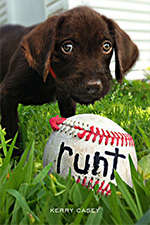 |
|
Runt
Kerry Casey
This is a book about baseball. Now I don’t normally do sports, but I do fiction and was asked to look over this book. I thought it might be an interesting change of pace, and it was.
The story starts out with a 29-year old baseball coach traveling to a small town in Iowa. He’s a good coach but down on his luck. He played for the Chicago Cubs until his career was ended by an injury. He was coaching at a high school and doing quite well, winning 4 state AA championships, until more bad luck cost him his job. But he hadn’t gone unnoticed and is now headed to a new opportunity in the town of Dannaka. Now you might guess how the story progresses, if I tell you there’s a kid on the team whose nickname is Runt….small but determined. And, of course, there’s a BIG game at the end.
The book is an easy read which I could come back to when I had a few minutes. It was fun to guess what the next turn of events would be and fun to read a few insights into baseball and how it is played. I think you will enjoy this book.
|
| |
|
|
|
|
|
| |
|
|
|
|
 Cascade Cascade |
|
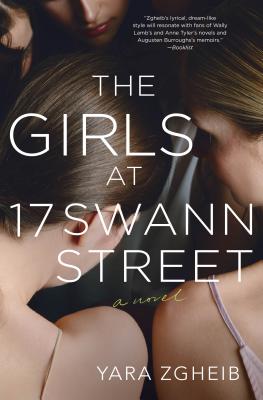
|
|
The Girls at 17 Swann Street
Yara Zgheib
Anna was a dancer, happily married to the man of her dreams. But after an injury and downward spiral, Anna was caught in the grips of anorexia nervosa, no longer able to dance, let alone sleep in the same bed as her husband without discomfort. Finally, no amount of denial could keep her family from the truth and they begged Anna to get help. Anna agreed and was admitted to a treatment program to live and get help with a slew of others with eating disorders. Here Anna had to decide what was most important to her--the control her anorexia gave her or her family. Told with unflinching honesty, this book was beautifully done. |
| |
|
|
|
|
|

Gail |
|
 |
|
|
| |
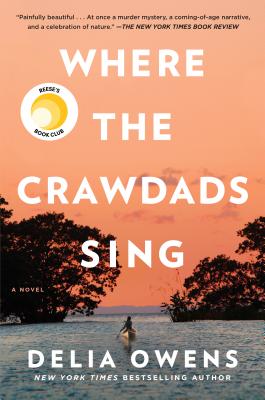
|
|
Where the Crawdad Sings
Delia Owens
Combining the world of nature, a possible murder, and a coming of age story, this novel has it all. For years rumors of "the marsh girl" have circulated in a small town in North Carolina. When the former football star of the local team is found dead, locals immediately suspect Kya, the marsh girl. The friend who loaned me the book says it was so good she wants to read it again! the author has written three nonfiction titles about her life as a wildlife scientist in Africa, but this is her first novel. Reese Witherspoon chose Where the Crawdads Sing for her book club.
|
| |
|
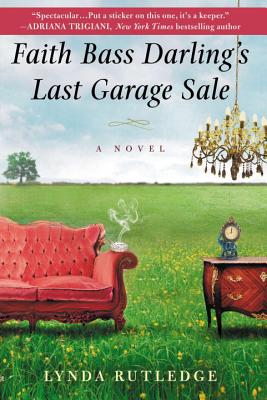
|
|
Faith Bass Darling's Last Garage Sale
Lynda Rutledge
Faith gets a message from God: sell all your antiques and valuables today as this your last day on earth! The title caught my eye as I enjoy garage sales. This turned out to be a book about changing lives, including those of the townspeople, her own daughter—and maybe yours. |
| |
|
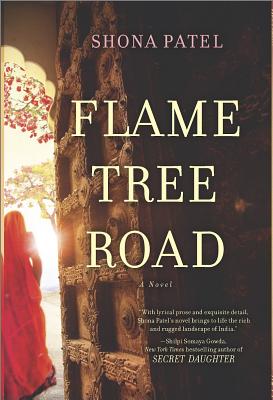
|
|
Flame Tree Road
Shona Patel
Biren Roy grows up in a poor village in the 1870's when the British still ruled India. The caste system is prevalent. Biren's father teaches him English. When his father dies, the rule is that the widow is cast out of the home and no one speaks her name again. Biren vows to change this rule and starts a school for girls. How Biren accomplishes his vow with help from both English and Indian friends makes a fascinating story. Author Shilpa Gowda is another author that writes stories of India. I have read several and thoroughly enjoyed them. Gowda wrote a positive review about Flame Tree Road which influenced me to read this great story.
|
| |
|
|
|
|
|

Hannah |
|
 |
|
|
|
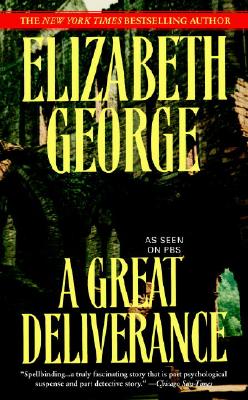
|
|
A Great Deliverance
Elizabeth George
Sally told me that if I am going to read George’s Inspector Lynley mysteries I need to start with the first book, and I’m so glad I did! What a wonderful introduction to the characters. Thomas Lynley is an aristocratic, compassionate, very successful inspector, but he has some inner demons. He’s partnered with Barbara Havers, a dumpy, pugnacious young woman who has alienated every other potential mentor. She hates aristocrats, but if she can’t work with Lynley she’s doomed to being a uniformed cop for the rest of her career. The case they are working is interesting, but it’s watching the two of them struggle internally and with each other that’s the real fascination. I couldn’t wait to see what happens in the next book to Havers, Lynley, and an assortment of friends and relations also introduced in A Great Deliverance.
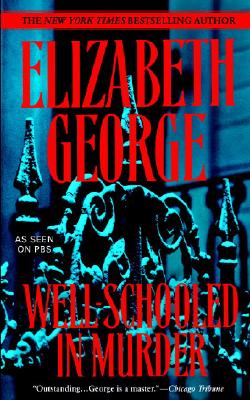 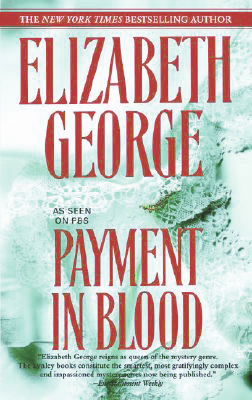 The next book, Payment in Blood, has a plot redolent ofAgatha Christie: dramatic characters are isolated in an old mansion, unable to leave because of a snow storm. There are aristocrats, servants, actors, a journalist: a variety of characters. Our detective friends are called in when one of the group is found murdered in her sleep. And as for Lynley, the book ends with him in a state that made me immediately turn to book three. In it, Well-Schooled in Murder, the characters I’ve grown to love struggle with life issues while solving a murder in a private school that feels like Hogwarts gone bad. Now I’ve got to go on to book four! The next book, Payment in Blood, has a plot redolent ofAgatha Christie: dramatic characters are isolated in an old mansion, unable to leave because of a snow storm. There are aristocrats, servants, actors, a journalist: a variety of characters. Our detective friends are called in when one of the group is found murdered in her sleep. And as for Lynley, the book ends with him in a state that made me immediately turn to book three. In it, Well-Schooled in Murder, the characters I’ve grown to love struggle with life issues while solving a murder in a private school that feels like Hogwarts gone bad. Now I’ve got to go on to book four!
|
| |
|

|
|
Things Fall Apart
Chinua Achebe
“There is no story that is not true,” said Uchendu. “The world has no end, and what is good among one people is an abomination with others.” This book reads like a cross between a novel and an African folk story. The author came from Africa but was educated in the west. The book tells the story of Okonkwo, a fierce and hard-working man, highly respected among his clan. Some of their customs are beautiful, and some are abominations to us, such as putting newborn twins out in the forest to die. But their culture has held them together for generations. Sometimes he has to suppress his inner thoughts and feelings, but life has worked well for Okonkwo. And then comes the white man, with guns and missionaries. Reading this classic, much-loved and influential book gives you a sense of what it must be like for people like Okonkwo when their world is turned upside down. |
| |
|
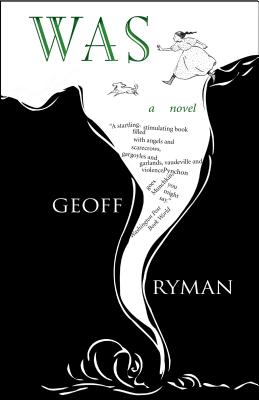
|
|
Was
Geoff Ryman
This is a dark novel centered around The Wizard of Oz, viewed through a variety of lenses. There’s a girl named Dorothy with a dog Toto: Dorothy is sent to live with Aunty Em and Uncle Henry when her mother dies of diphtheria. But the relatives she comes to are deeply flawed people, and their tiny cabin and hardscrabble farm are far from homey. Then there’s Judy Garland and her difficult childhood, and Judy’s mother, and an autistic boy who sees the Oz characters all around him. Only Frank Baum is treated quite kindly by Ryman. It’s a cynical look at America, and this book is not for everyone. But if you find this quotation intriguing you will find the book fascinating: “The world was haunted. It needed to be haunted. The Land of Was was cradled in the arms of Now like a child. Was made Now tender.“
Ryman is generally a fantasy writer, but this book is heavily researched. Before the acknowledgements he includes a “Reality Check” that helps identify which parts of the novel are fact-based. Be ready to accept ambiguity: sometimes you don’t know whether you are reading about visions, caused by a character’s madness or AIDS, or whether the author is giving you permission to believe in unreality. |
|
|
|
|
|
|
| |
|
|
|
|

Tim
|
|
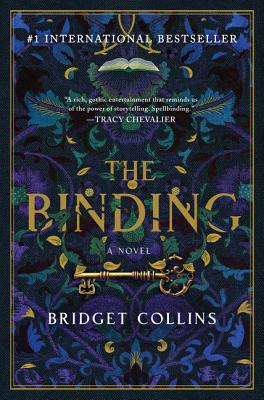
|
|
The Binding
Bridget Collins
This book is a clever Mystery/Fantasy/Science Fiction tale that I finished in record time simply because I couldn’t stand not knowing how it would unfold next. Just ten more pages, and then I’ll turn out the light…. OK, well just ten more. The characters were believable, even in the midst of some pretty strange stuff, which oddly made sense. There’s lots to think about here when you’ve done, which I think is a good indication of a quality story.
|
| |
|
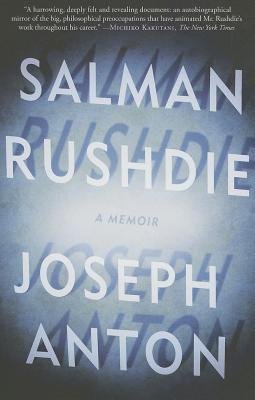
|
|
Joseph Anton
Salman Rushdie
If you’re a book lover and reader who is fiercely opposed to anyone telling you what you can read or write, this is the book for you. Joseph Anton is the name Rushdie used while he was under condemnation by the Iranian authorities for supposed heresy because he wrote the now famous Satanic Verses. It’s a biography that covers the nearly ten years he was under protection by the British Government, after Iran pronounced a fatwa (death sentence) on him, for having written a book they didn’t (or wouldn’t) understand. In the book he is quite candid about his personal failings, but all the while he remains true to the belief that no one should be able to censor what we write or read.
|
| |
|
|
|
|
|
Would you like to be a guest reviewer?
Email Sally at sally@beagleandwolf.com |
| |
|
|
|
|
|
— page top —
|
|



 Jen
Jen



 I’m reading the script of The Mousetrap over and over and over, in preparation for the production of it this month in Hubbard at Long Lake Theater. I hope you’ll come to see it! (This shameless plug was provided by Vision Theatre, producer of aforementioned Mousetrap.)
I’m reading the script of The Mousetrap over and over and over, in preparation for the production of it this month in Hubbard at Long Lake Theater. I hope you’ll come to see it! (This shameless plug was provided by Vision Theatre, producer of aforementioned Mousetrap.)
 Sally
Sally



 Cascade
Cascade













 The next book, Payment in Blood, has a plot redolent ofAgatha Christie: dramatic characters are isolated in an old mansion, unable to leave because of a snow storm. There are aristocrats, servants, actors, a journalist: a variety of characters. Our detective friends are called in when one of the group is found murdered in her sleep. And as for Lynley, the book ends with him in a state that made me immediately turn to book three. In it, Well-Schooled in Murder, the characters I’ve grown to love struggle with life issues while solving a murder in a private school that feels like Hogwarts gone bad. Now I’ve got to go on to book four!
The next book, Payment in Blood, has a plot redolent ofAgatha Christie: dramatic characters are isolated in an old mansion, unable to leave because of a snow storm. There are aristocrats, servants, actors, a journalist: a variety of characters. Our detective friends are called in when one of the group is found murdered in her sleep. And as for Lynley, the book ends with him in a state that made me immediately turn to book three. In it, Well-Schooled in Murder, the characters I’ve grown to love struggle with life issues while solving a murder in a private school that feels like Hogwarts gone bad. Now I’ve got to go on to book four!
